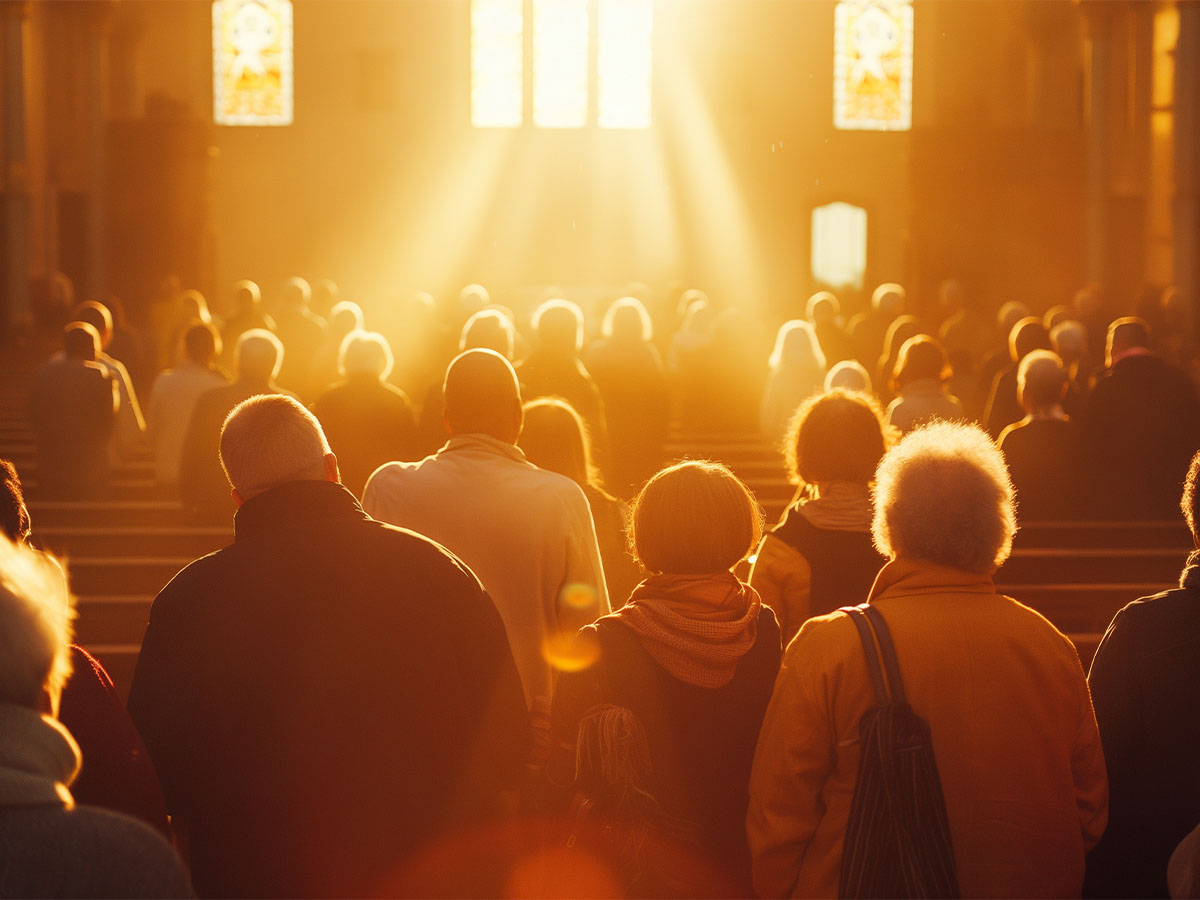
Church attendance and membership in the U.S. are declining at an alarming rate, which raises as obvious question: Why? To find answers, the American Bible Society recently commissioned a survey of American adults that looked at how Americans feel about church, temple or other faith communities. And several words stood out in their responses: believing, belonging and becoming.
The American Bible Society has released its new findings in the fifth chapter of its 14th annual State of the Bible report. The chapter “focuses on data that determine positive factors that increase Americans’ participation in a local faith community and negative factors that decrease participation,” the organization said.
John Farquhar Plake, PhD., the society’s chief innovative officer and editor-in-chief of the State of the Bible series, provided an overview of the findings. “The top answers, for both positive and negative responses, are about belonging,” he said. “When churchgoers feel that they belong, they participate more. And when they feel excluded by cliques, they drift away.
(For more information on previous chapters in the 2024 report, click below:
Arguments, Division & Chaos
Arguments, division and even scandals aren’t new problems in the Christian church, the American Bible Society pointed out. The New Testament describes the church in Corinth, where people argued, divided into factions, experienced chaos and even dealt with a sex scandal.
Even so, the apostle Paul saw a situation in which nonbelievers attended a service and said, “God is really among you!” (See Corinthians 3:3-4, 6:1-7, 11:20-21; 14:29-33, 12:15-27, and 5:1-2.)
Key Findings of Chapter 5
Participants in the study for chapter five were given a list of nine positive experiences and asked to select those that would increase their involvement in church or other faith organizations. They could choose as many items as they liked.
Forty-two percent opted out of answering the question, saying they weren’t involved in a faith community or organization.
“This figure is substantially more than the unaffiliated, the ‘nones’ (26 percent), suggesting that there’s another group of people (we might call them ‘nominals’) who identify with a certain religious tradition but do not participate in it,” the American Bible Society said.
Importance of Positive Experiences
When churchgoers were asked how they felt about church, they responded in several ways.
- The top three positive experiences selected by people involved in a faith community were:
- Community and a sense of belonging as important: 55 percent
- Shared spiritual beliefs and faith: 53 percent
- Meaning and purpose: 51 percent
- Among churchgoers, a slightly smaller group (48 percent) mentioned worship and ceremonies. Other choices included religious education and learning (38 percent), cultural or family tradition (29 percent), community service and outreach (27 percent) and conversion or religious experience (14 percent)
- Thirty-two percent of all respondents cited community and a feeling of belonging, 31 percent said shared spiritual beliefs and faith were important, and 29 percent chose meaning and purpose.
- Women reported more positive experiences than men did and were more likely to cite their experiences as reasons to increase involvement with a faith community. Generational differences were minor, although baby boomers reported more positive experiences than younger people did, the report said.
- Surprisingly, 61 percent of rural residents and 61 percent of big city dwellers said a sense of community and a feeling of belonging were important factors. However, only 41 percent of people living in middle-size cities reported experiencing a sense of meaning and purpose.
- “Perhaps most surprising was the lack of difference in the opt-out statement: ‘I do not participate in a church, temple or faith community,’” the report said.
- People who volunteer in their faith community are more likely than other churchgoers to “credit their involvement to a sense of community and belonging” at 68 percent and 55 percent, respectively. These findings indicate “a sense of deep care for the community they both maintain and participate in,” the society said. Learn more here.
Problems with Negative Experiences
Cliques, unresolved conflicts within the church and inadequate spiritual care were problematic for many people.
- 20 percent of all respondents said they were put off by cliques in church. “Though it may appear to be an insignificant percentage, this represents around 50 million Americans dissuaded from church participation,” the American Bible Society noted.
- One-sixth of people who are engaged in reading or studying the Bible – called Scripture Engaged – cited “unresolved conflict within the church” as a reason for becoming less involved.
- People who aren’t engaged in the Bible but are open to learning more – called the Movable Middle – “are more likely to say they haven’t received adequate spiritual care, thus affecting their relationship with the faith community.”
Denominational Differences
Denomination matters, although only slightly, the report said. When asked how they feel about church, evangelicals were more likely to report positive experiences than other groups.
- About 66 percent of evangelicals identified shared beliefs as a positive experience that increased their participation.
- Sixty-three of mainline Protestant churchgoers cited a feeling of community and belonging as a positive experience.
- And 43 percent of active Catholics said cultural or family tradition drew them to church.
Church Attendance
Since the pandemic ended, 75 percent of churchgoers attend in person, while 14 percent attend online and 11 percent split their attendance between the two options. The report cited four reasons that “you gotta be there”:
- Feeling of community and belonging
- Worship and ceremonies
- Community service and outreach
- Cultural or family tradition
Eighty percent of people who identified these positive experiences attend church in person. Those who attend every week are enthusiastic, but the level of enthusiasm substantially drops among people who attend church once a month or less frequently.
Researchers also asked participants in the survey about actual experiences that drove them away from church. These were the findings:
- Exclusion or cliques within the church, 20 percent
- Judgment or condemnation of my choices or lifestyle, 19 percent
- Disagreement with a church’s biblical teachings or social commentary, 18 percent
- Financial improprieties or exploitation, 14 percent
- Unresolved conflicts in the church, 12 percent
- Spiritual manipulation or abuse, 11 percent
- Insufficient spiritual care, 7 percent
- Feeling unsafe in the church, temple or faith community, 5 percent
- None of the above, 52 percent
People who are scripturally engaged reported fewer problems except in two areas: cliques and unresolved conflicts. The Movable Middle, who are not spiritually engaged but are open to the Bible, were more likely than other groups to say they don’t receive the spiritual care they need.
“It might be that many of these people expect pastors to be mind readers, knowing what people want even if they don’t ask for help,” the report noted. “Still, we see here a spark that might reveal a ministry opportunity.”
Researchers found three areas in which online church attendees were far more critical of church than in-person churchgoers:
- Judgment (24 to 14 percent)
- Financial improprieties (18 to 7 percent)
- Spiritual manipulation (13 to 6 percent)
“Might this suggest that online services are a haven for those who don’t fully trust the church?” the report asked.
Volunteers
People who have volunteered in their church were much more likely than others to highlight positive experiences, with two-thirds of volunteers mentioning they experienced a feeling of community and belonging. The reason may be that volunteers are actively engaged in their faith community or volunteer because they care about it.
When asked how they felt about church, 40 percent of volunteers said they valued community service and outreach, as compared to 27 percent of all churchgoers. And they had fewer complaints about the church except for problems with exclusion and cliques.
Volunteers were more troubled than non-volunteers about unresolved conflicts (20 percent versus 10 percent). In addition, 10 percent of volunteers complained they haven’t received sufficient spiritual care when they needed it, as compared to 7 percent of non-volunteers.
Chapter five of the State of the Bible report explained, “The church is not just an organization; it’s an organism. The New Testament compares it to a human body. As such, it suffers pains and strains and sprains, but it can also pull all its systems together to do great things.
“We salute its volunteers, we strive to equip its leaders, and we cheer on those who participate week after week, in person or online. We also pray for hope, help, and healing for the outsiders.”
What’s Next for State of the Bible?
The American Bible Society will release four new chapters to the 2024 State of the Bible report this September-December. The research will look at societal and cultural influences, loneliness and philanthropy.
State of the Bible findings are based on a nationally representative survey performed by NORC at the University of Chicago for the American Bible Society. “The data came from 2,506 online interviews with American adults in all 50 states and the District of Columbia,” the society said.


